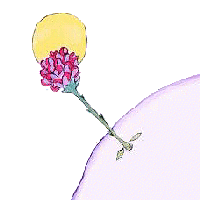VII
LA KVINAN tagon, denove dank'al la ŝafeto, la sekvantan sekreton pri la vivo de la eta princo estis malkaŝita al mi. Abrupte, sen antaŭklarigo, kvazaŭ rezulte de problemo longe kaj silente meditita, li demandis min:
"Ŝafeto, se ĝi manĝas arbustojn, ankaŭ florojn ĝi manĝas, ĉu ne? " "Ŝafon ĉion manĝas, kion ĝi trovas. " "Ĉu eĉ tiujn florojn, kiuj havas dornojn? " "Jes, eĉ florojn, kiuj havas dornojn. " "La dornoj, do, por kio servas? " Mi ne scias, Mi tiam estis tre okupata, provante malŝraŭbi tro sreĉitan bolton de mia motoro. Mi estis zorgoplena, ĉar mia paneo jam ekmontriĝis vere serioza, dum la trinkakvo malpliiĝis, kaj mi timis la plej malbonan.
"La dornoj, do, por kio servas?" La eta princo neniam rezignis pri jam metita demando. Mi malpacienciĝis pro mia bolto kaj respondis sen pripensaĵon:
"Dornoj havas nenian utilon. Tio estas pura malico flanke de la floroj! " "Ho! " Sed post silenteto li kvazaŭ malpardoneme pafis al mi:
"Mi ne kredas al vi! La floroj estas malfortaj. Ili estas naivaj. Ili trankviliĝas, kiel ili povas. Ili pro siaj dornoj kredas sin teruraj..." Mi nenion respondis. En tiu momento mi pensis: "Se ĉi tiu bolto plue rezistos, mi elsaltigos ĝin per martelo." La eta princo denove entrudiĝis en mian cerbumadon:
"Kaj vi, vi kredas ke la floroj..." "Sed ne! Sed ne! Mi nenion kredas!" mi respondis senpripense. Mi ja zorgas pri seriozaĵoj. " Li rigardis min mirigite.
"Pri seriozaĵoj! " Li vidis min tenantan enmane mian martelon, dum miaj fingroj estis nigrigitaj de ŝmiroleo, kliniĝantan super objekto, kiu ŝajnis al li tre malbela.
"Vi parolas kiel grandpersonoj! " Tio iom hontigis min. Sed senkompate li aldonis:
"Vi konfuzas ĉion, miksas ĉion! " Li vere estis tre kolera. Li skuadis en la vento siajn orajn harojn:
Mi konas planedon, kie troviĝas karmezina sinjoro. Neniam li priflaris floron. Neniam li rigardis stelon. Neniam li amis homon. Neniam li ion alian faris krom adicioj. Kaj dum la tuta tago li ripetas kiel vi: 'Mi estas serioza viro! Mi estas serioza viro!' kaj pro tio li fierege ŝveliĝas. Se li ne estas homo, li estas fungo! " "Kio li estas? " "Fungo! " La eta princo jam estis tute pala pro kolero. "Dum milionoj da jaroj la floroj fabrikis dornojn. Dum milionoj da jaroj la ŝafoj tamen manĝis la florojn. Kaj ĉu ne estas serioze klopodi por kompreni, kial ili tiel multe penas por fabriki por si dornojn, kiuj neniam utilas? Ĉu ne estas gravaĵo la milito inter ŝafoj kaj floroj? Ĉu tio ne pli seriozas kaj pli gravas, ol adicioj de iu dika ruĝvizaĝa sinjoro? Kaj, se mi mem konas floron unikan en la mondo, kiu ekzistas nenie krom sur mia planedo, kaj kiun ŝafeto povas iun matenon nekonscie neniigi per unusola gluto - kaj jen farite - , ĉu tio ne estas ja grava afero? " Li ruĝiĝis kaj daŭrigis:
"Se iu amas floron, unusolan en ĝia speco inter milionoj kaj milionoj da steloj, al tiu sufiĉas por esti feliĉa, ke li rigardu ilin. Li diris al si: "Ie tie estas mia floro..." Sed, se la ŝafeto formanĝis la floron, estas por li, kvazaŭ ĉiuj steloj subite estingiĝus! Kaj ĉu tio mem ne gravas? " Nenion plu mi povis diri. Li subite ekploregis.
Jam noktiĝis. Mi maltenis miajn ilojn. Mia martelo, mia bolto, la soifo kaj la morto ne plu gravis. Sur iu stelo, iu planedo, sur la mia, sur la Tero, unu eta princo bezonis konsolon. Mi lin brakumis, lin lulis. Mi diris al li: "La floro, kiun vi amas, ne estas en danĝero... Mi ja desegnos buŝumon por via ŝafeto. Mi desegnos kiraseton por via floro... Mi..." Mi ne tro bone scias, kiam ion diri. Mi min sentis tre mallerta. Mi ne sciis, kiel atingi lin, kiel kontakti lin...
Ja tiel mistera estas la lando de larmoj.

